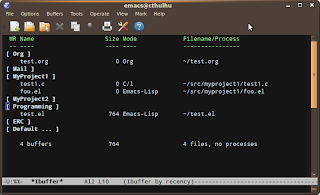Wanderlust
I have been using the Wanderlust E-mail client for almost a year now, and I am very happy with it. In previous postings I already discussed setup and some tips and tricks; and I also had somewhat related posts on bbdb (the address book) and warning you about new mail. But I think it's time for an update.
maintenance
One question that I have received quite a few times was about the maintenance of Wanderlust; it's may be a nice e-mail client, but little seems to have happened in the last few years. It's reasonable concern.
Fortunately, it seems the situation has improved significantly. There's more traffic on the mailing lists, both from old and new users. Various improvements are circulating; the place to get the latest stuff is in David Abrahams' git-repository: semi, flim, apel and wanderlust. The plan is to gradually apply the changes to the upstream (CVS) repository.
bugs
Although I have been quite happy with Wanderlust, there was one bug #5534 that has bitten me a few times, causing occasional hangs when saving (draft) messages with non-ascii characters. It seemed finally to be a bug in emacs itself, which is triggered by something in Wanderlust. A fix will probably be available for the next emacs version; until then, you can work around this by using an external MIME-encoder. To do this, add the following to your WL initialization code (thanks to various helpful people on the WL mailing list):
(setq mel-b-ccl-module nil) (setq mel-q-ccl-module nil) (setq base64-external-encoder '("mimencode")) (setq base64-external-decoder '("mimencode" "-u")) (setq base64-external-decoder-option-to-specify-file '("-o")) (setq quoted-printable-external-encoder '("mimencode" "-q")) (setq quoted-printable-external-decoder '("mimencode" "-q" "-u")) (setq quoted-printable-external-decoder-option-to-specify-file '("-o")) (setq base64-internal-decoding-limit 0) (setq base64-internal-encoding-limit 0) (setq quoted-printable-internal-decoding-limit 0) (setq quoted-printable-internal-encoding-limit 0) (setq-default mime-transfer-level 8) (setq mime-header-accept-quoted-encoded-words t)
This requires the mimencode-program, which is part of the
metamail-package. For the time being, this seems to be the best solution
when using Wanderlust with Emacs 23.
one more trick: reformatting
Let's finish with one more trick. Sometimes, incoming mail is formatted quite badly; in particular, the new lines are too long for comfortable reading. From the WL-mailing list, here's a trick to deal with that:
(require 'filladapt) ;; from a WL mailing list post by Per b. Sederber ;; Re-fill messages that arrive poorly formatted (defun wl-summary-refill-message (all) (interactive "P") (if (and wl-message-buffer (get-buffer-window wl-message-buffer)) (progn (wl-summary-toggle-disp-msg 'on) (save-excursion (set-buffer wl-message-buffer) (goto-char (point-min)) (re-search-forward "^$") (while (or (looking-at "^\\[[1-9]") (looking-at "^$")) (forward-line 1)) (let* ((buffer-read-only nil) (find (lambda (regexp) (save-excursion (if (re-search-forward regexp nil t) (match-beginning 0) (point-max))))) (start (point)) (end (if all (point-max) (min (funcall find "^[^>\n]* wrote:[ \n]+") (funcall find "^>>>>>") (funcall find "^ *>.*\n *>") (funcall find "^-----Original Message-----"))))) (save-restriction (narrow-to-region start end) (filladapt-mode 1) (fill-region (point-min) (point-max))))) (message "Message re-filled")) (message "No message to re-fill"))) (define-key wl-summary-mode-map "\M-q" 'wl-summary-refill-message)
Now, you can refill your messages with M-q when in the Summary.
If you have any other nifty WL-tricks that could be useful for others, please share them in the comments, thanks!
